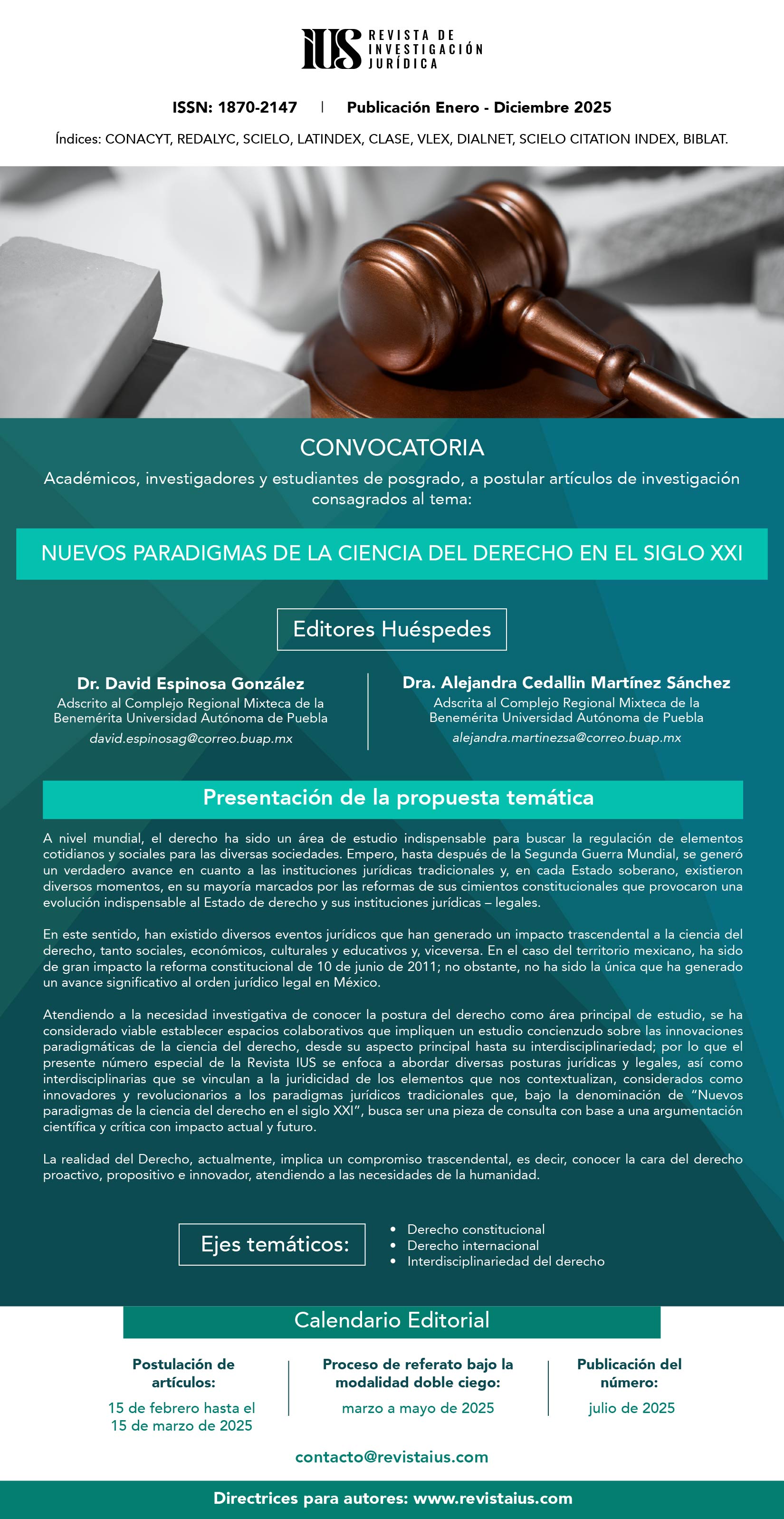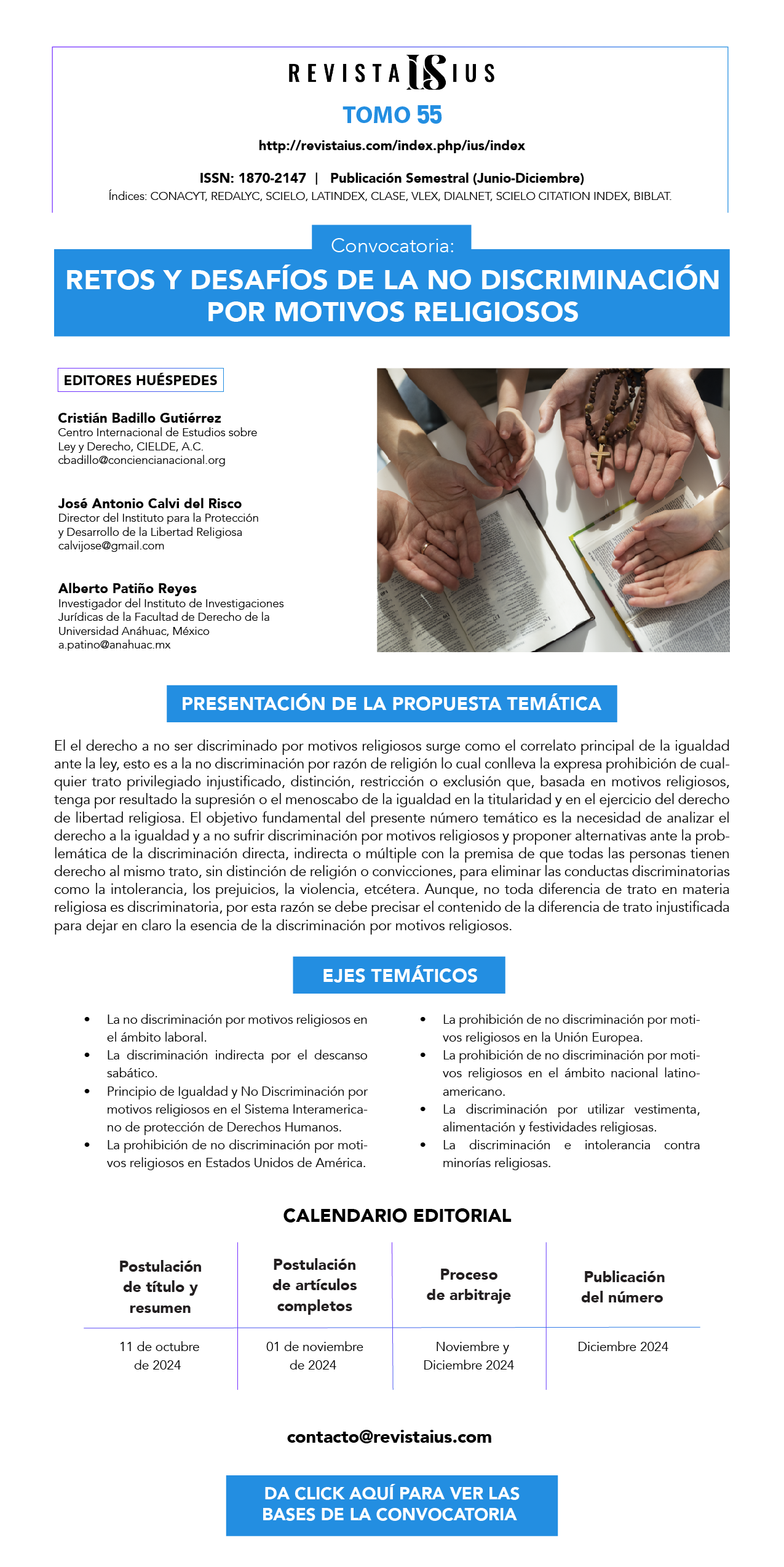The right to likeness for children and adolescents in the context of information and communication technologies
DOI:
https://doi.org/10.35487/rius.v14i46.2020.545Keywords:
Responsabilidad, Patria Potestad, Derecho a la imagenAbstract
El objetivo de este artículo es reflexionar sobre los alcances, límites y responsabilidades de quienes ejercen la patria potestad de niñas, niños y adolescentes, con relación al respeto al derecho a la imagen y el interés superior de la niñez cuando difunden sus imágenes a través de las Tic´s. Lo anterior desde una visión ética, del principio de responsabilidad con enfoque desde la dignidad, los derechos de la personalidad en el aspecto del patrimonio moral del derecho a la imagen y la intimidad y sus implicaciones contemporáneas.
Downloads
References
Brage Camazano, Joaquín. “Los límites a los derechos fundamentales”, Dykinson,
Madrid, 2004.
Calatayud Chavez, David. “La intimidad en los menores o la menor intimidad” en
Antonio Vallés Copeiro del Villar y Hugo Aznar Gómez (Coordinadores) ¨Sobre la intimidad”, Fundación Universitaria San Pablo C.E.U., Valencia, 1996.
Carrillo, Marc. “El derecho a no ser molestado”, Thomson Aranzadi, Navarra, 2003.
Escobar de la Serna, Luis. “Derecho de la Información”. 3ª. Edición, Dykinson,
Madrid, 2004.
Gutiérrez y González, Ernesto. “El patrimonio”, Quinta edición, Porrúa, 2002.
Jonas, Hans, “El principio de responsabilidad” Ensayo de una ética para la
civilización tecnológica, Traductor Javier Ma. Fernández Retenaga, Herder,
España, 1995.
Oehling de los Reyes, Alberto. “La Dignidad de la Persona”, Evolución histórico-
filosófica, concepto, recepción constitucional y relación con los valores y
derechos fundamentales, Dykinson-Constitucional, Madrid, 2010.
Rebollo Delgado, Lucrecio. “El Derecho fundamental a la intimidad”, 2ª edición,
Dykynson, Madrid, 2005
Riemen, Rob. “Para combatir esta era”, Consideraciones urgentes sobre el fascismo
y el humanismo, Traducción de Romeo Tello A., Taurus, México, 2017.
Venegas Grau, María. “Derechos fundamentales y Derecho privado, Los derechos
fundamentales en las relaciones entre particulares y el principio de
autonomía privada, Marcial Pons, Barcelona, 2004.
Downloads
Published
Issue
Section
License
Revista IUS, published by the Legal Sciences Institute of Puebla A.C., is distributed under the Creative Commons Attribution-NonCommercial 4.0 International (CC BY-NC 4.0) license.
We authorize collaborators to upload a copy of their published work on their personal websites or any Open Access repository, provided that Revista IUS is specifically cited as the original source, indicating the year and issue of the respective example and adding the link to the webpage on which this publication can be freely consulted in toto and without charge: http://www.revistaius.com
Readers are free to:
Share, copy and redistribute the material via any medium or format.
The licensor cannot revoke these freedoms as long as you follow the license terms.
Under the following terms:
Attribution: You must give appropriate credit, provide a link to the license, and indicate if changes were made.
You may do so in any reasonable manner, but not in any way that suggests the licensor endorses you or your use.
NonCommercial – You may not use the material for commercial purposes.
If you remix, transform or build upon the licensed material, its distribution is not permitted.
Charges for managing articles: Revista IUS will not charge for receiving, processing or publishing articles (Article Processing Charge, or APC) submitted by authors.





